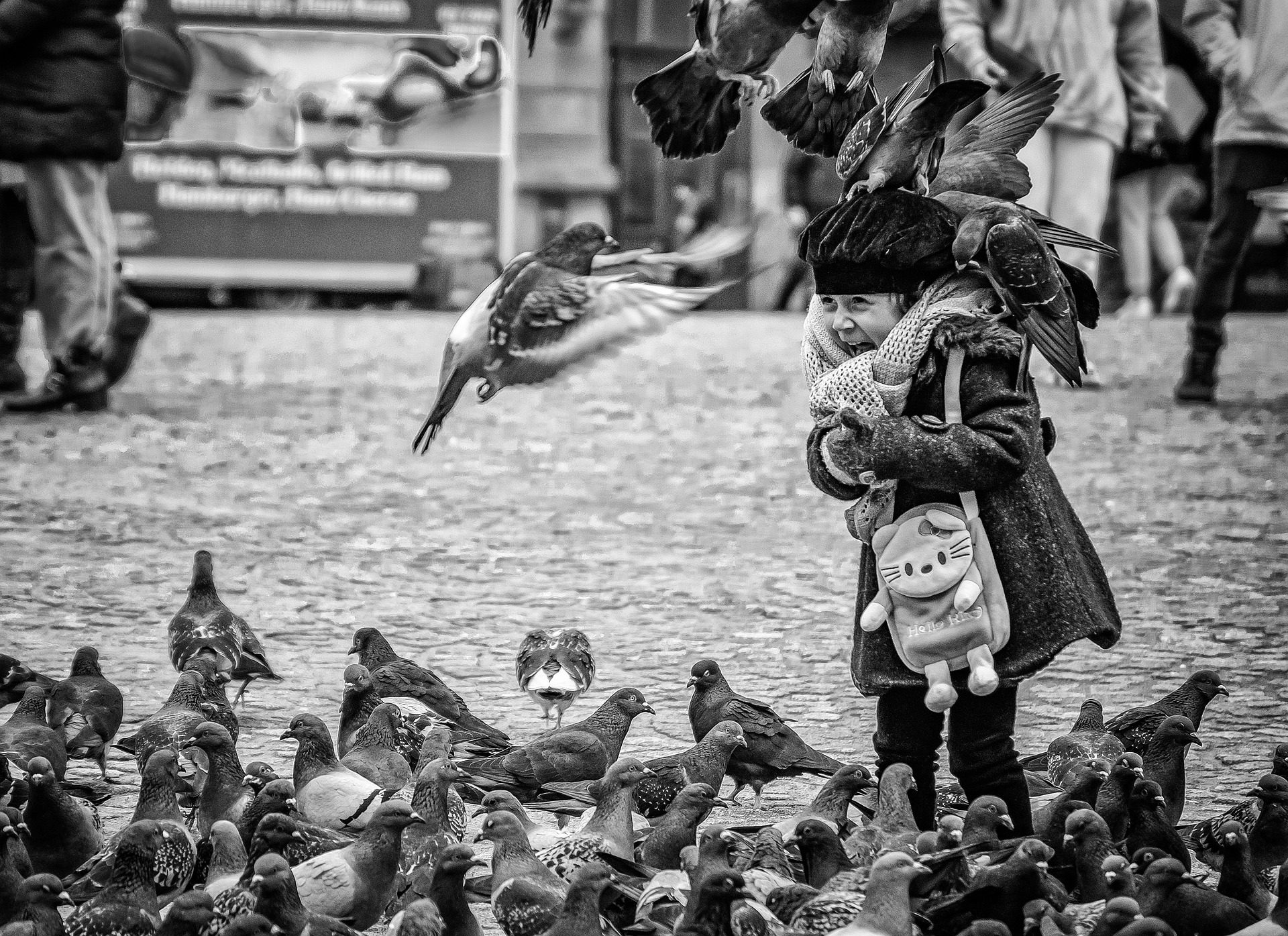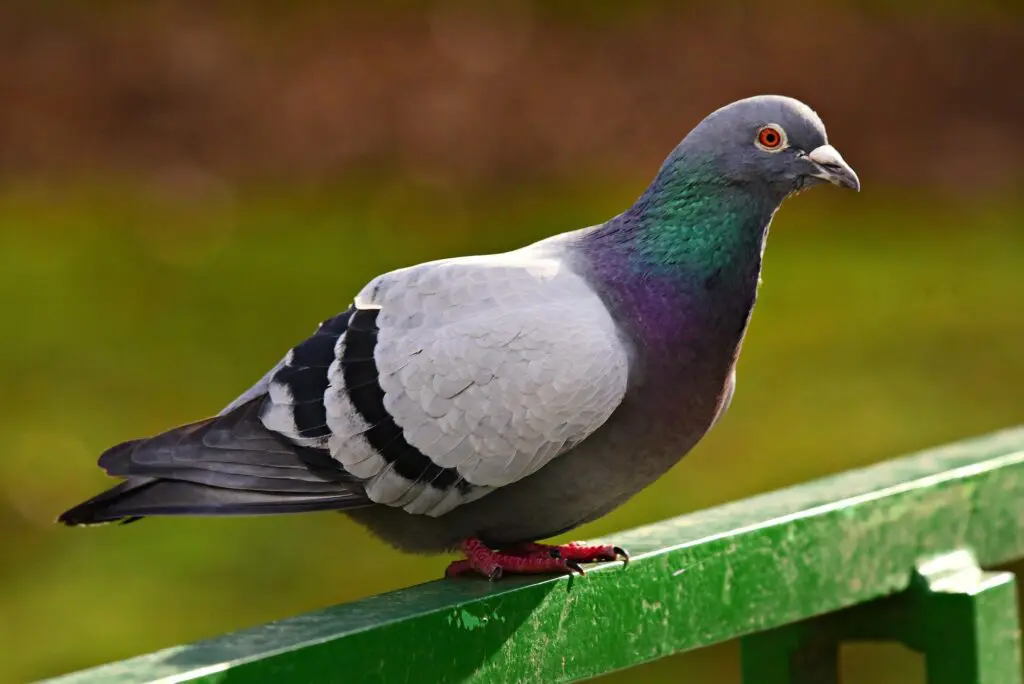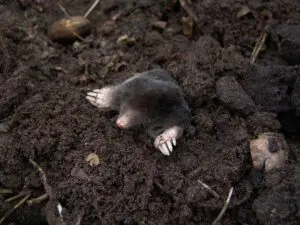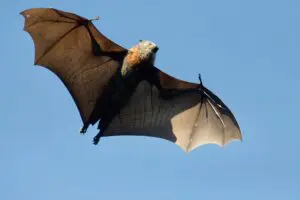

Did you know pigeon droppings were once considered a valuable fertilizer? That trend obviously didn’t last into modern times (probably for good reason), but if you think pigeon-poop fertilizer sounds crazy, just wait until you read these next facts!
1. Pigeons may have been the first domesticated bird.
People have been keeping pigeons as pets for a very long time. In fact, pigeons are portrayed in Mesopotamian art from as far back as 4500 BCE! Scientists believe these pieces of art are the first recorded images of pigeons. Additionally, pigeons have been a significant food source for thousands of years. These facts have led to the theory that pigeons may have been the first birds humans ever domesticated.
2. Some pigeons are war veterans.
During the 20th century, it was common for countries to have flocks of homing pigeons for military use. The birds could quickly deliver important messages between bases or across enemy lines. Pigeons are credited with saving thousands of lives through the information they so diligently delivered, commonly known as pigeon post. One pigeon named G.I. Joe saved british troops from a bombing with 5 minutes to spare. Another by the name of Cher Ami delivered a total of 12 important messages for the U.S. military during WWI. On his last mission, Cher Ami was shot in the breast and still managed to fly for another 25 minutes, completing his mission and saving the lives of 194 stranded soldiers.
3. Pigeons save lives outside of the military as well.
Historically, pigeons were released from sinking boats to send for help. Pigeons have also been trained to aid in rescuing people lost at sea. They locate the people who are stranded and notify rescuers of the location. They are perfect for this job because, in addition to having great eyesight, they can detect the ultraviolet light that surrounds the people in the water.
4. Pigeons are navigation experts.
Believe it or not, pigeons can find their way home from an astounding 1,300 miles away! What’s more, they have proven that they can do so after being transported in complete isolation to a location they’ve never been. The cages were even rotated during transportation to prevent the birds from knowing which direction they were traveling in. Scientists do not fully know how pigeons manage to find their way back when they have no visual, olfactory, or magnetic clues to aid them in knowing their location. However, they now believe that pigeons actually have compass and map mechanisms that help them navigate. While the map mechanism remains a mystery, it is likely that the compass mechanism relies on the sun’s position.

5. Pigeons are fast.
Pigeons are very fast birds, which is one of the reasons they make great messengers. Their speed also makes them great racers. Pigeon racing is a surprisingly lucrative business and racing pigeons can be quite expensive- the most expensive pigeon ever sold cost nearly $1,900,000!
6. Pigeons are excellent mail carriers.
Modern technology allows us to send a message to someone instantly, but communicating was not always so easy. Due to their navigational skills, speed, and the fact that they can carry up to 10% of their body weight, pigeons have long been used for communication purposes. In the 5th century A.D., countries like Egypt and Syria used carrier pigeons. During ancient Olympic games, pigeons were used to deliver the results of the events to fans. In the 1800’s, the Rothschild family used their network of pigeon lofts to communicate about finances. Pigeons were much faster than other available forms of communication, which gave the family an advantage that helped them greatly expand their fortune. At one time pigeons made up the largest system of communication in the world!
7. Pigeons could be weather reporters.
Pigeons are able to hear certain frequencies that humans cannot. This allows them to sense things like volcano eruptions and incoming storms that meteorologists haven’t even discovered yet.
8. Pigeons produce “milk.”
Of course, they don’t produce actual milk- only mammals can do that. However, it is essentially the same as milk in that it is a white liquid containing all the necessary antioxidants, fats, nutrients, and proteins a baby bird needs. Another similarity it shares with mammal milk is that its production is regulated by the hormone prolactin. Both male and female adult pigeons produce this milk in their crop. The crop is a little section in a bird’s esophagus meant for storing food and, in this case, producing crop milk. Pigeons are part of a small group of birds that produce crop milk, only joined on the list by doves, flamingoes, and male emperor penguins.
9. Newborn pigeons are a rare sight.
Have you ever wondered why you never seem to see baby pigeons among the flock? That is because newly-hatched pigeons stay in the nest for up to six weeks- longer than most bird species. When they do finally leave, they look almost exactly like a fully-grown adult pigeon, other than the downy feathers on their head and the lack of red around their eyes. A pigeon’s eyes don’t get red until between seven months and one year of age.

10. Pigeons can recognize themselves.
Most birds cannot recognize their own image. Pigeons, however, are able to identify themselves over a picture of a different pigeon. Their recognition skills don’t end there, though- they are also able to differentiate between photos of different humans.
11. Pigeons can detect cancer.
Many people don’t know just how smart pigeons are. They can be trained to recognize words and to match art with its artist, but what is perhaps most impactful is that they can even be taught to differentiate between benign and malignant growths. Researchers at the University of California Davis trained pigeons to identify which biopsies were benign and which were malignant. Once they were taught how to distinguish between the two, the pigeons were able to use their newfound knowledge to “diagnose” brand new biopsies that they had never seen before. On average, a pigeon by itself had an 85% accuracy. In a group, their accuracy reached 99%, which is what is expected from a doctor.
Bonus:
Contrary to popular belief, pigeons are very clean birds and the risk of getting any disease from a pigeon is extremely low.
Want more information about pigeons as a pest? Check out our Bird Exclusion page, or take a look at this guide to pigeon prevention.






